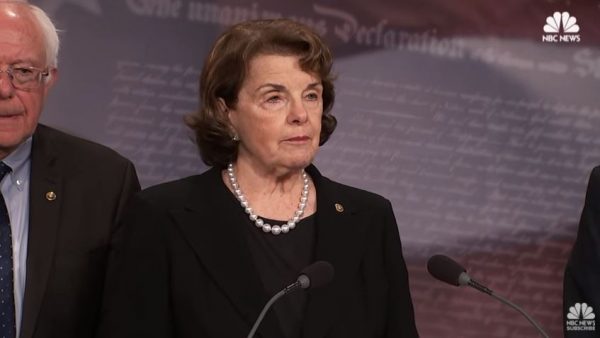
Watch out Senators Dianne Feinstein and Charles Schumer; according to a new Rasmussen survey, 74 percent of likely U.S. voters think politicians raise the gun issue to get elected.
That would put the two perennially anti-gun pols at the top of the crass heap.
One part of Rasmussen’s narrative about this survey was troubling because the group seems to woefully underestimate the number of American gun owners, at 55 million. Other estimates run as high as 80-90 million gun owners who possess somewhere north of 300 million firearms.
Because of that one revelation of the Rasmussen survey released Monday seems irrefutable. Seventy-six percent of likely American voters do not believe it is possible for the government to confiscate all privately owned firearms. Astonishing as it might seem, 22 percent of survey respondents think it might be possible to confiscate those guns, with 10 percent who think it is “very possible.” Gun rights activists might consider that to be delusional.
Since the Las Vegas massacre which claimed the lives of 58 people and left hundreds injured, there has been lots of talk about gun control. Schumer and Feinstein have both been busy, touting this or that suggestion. Feinstein has even introduced legislation to ban “bump stocks,” though that questionable solution may be causing a consumer rush to buy the things.
Still, as reported Monday, Feinstein candidly acknowledged on CBS’ “Face the Nation” that the gunman in Las Vegas would not have been stopped by any of the existing or proposed laws because he passed background checks. He also did not have a criminal record.
For his part, Schumer has complained about the proposed national concealed carry reciprocity legislation, which has no bearing on Las Vegas. The killer didn’t use a concealed handgun.
On the day after Las Vegas was turned into a killing field, New York Times columnist Nicholas Kristof rattled off a wish list of gun control measures that, say some critics, simply amount to nonsense.
At the top of his list: Impose universal background checks before buying a gun. Recent history – including Feinstein’s acknowledgement about the checks that killer Stephen Paddock passed – make that argument specious. With but a couple of exceptions, recent mass shooters in the United States have passed background checks. The killers in Aurora, Santa Barbara, Tucson, Fort Hood, the Washington, D.C. Navy Yard, Mukilteo and on down the list passed background checks. Sandy Hook monster Adam Lanza didn’t bother, because he murdered his mother and took her guns. She had purchased them legally, passing background checks.
Kristof would prohibit gun sales to anyone under 21. Well, Paddock was 64; another ridiculous argument.
Kristof wants to enforce a ban on gun possession by anyone under a domestic violence order. Paddock was under no such order. Here, again, Kristof is trotting out the entire gun control agenda, just to see if it gains traction from a tragedy.
Another of his suggestions is to adopt microstamping, a technology that has, so far, been a dismal flop, along with another of his recommendations: “Smart Gun” technology.
And Kristof also wants to “limit gun purchases by any one person to no more than, say, two a month and tighten rules on straw purchasers who buy for criminals.” It’s already a federal crime to engage in a straw purchase, so how does one make that tougher? As for putting limits on gun purchases, when has that worked?
Gun prohibitionists are offering nothing new. They have simply repackaged a long standing agenda and set the stage to complain when Congress and state legislatures once again say “no.”